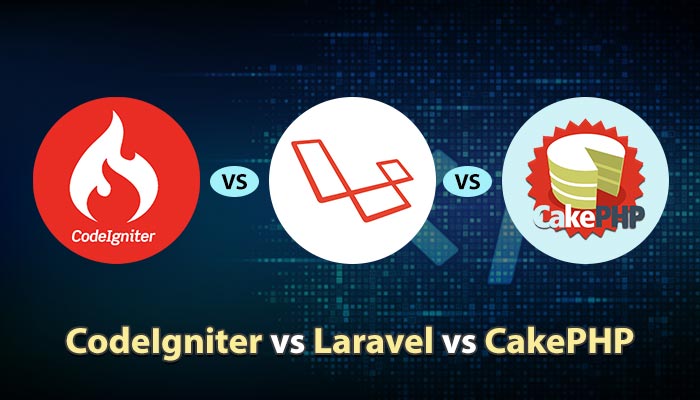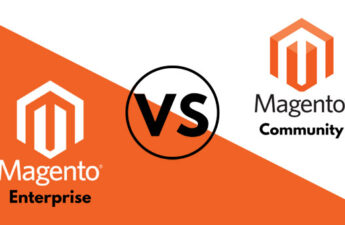Choosing the right PHP framework for your web development needs is an important decision that can impact the efficiency and scalability of your projects. Laravel, CodeIgniter, and CakePHP are all popular PHP frameworks, each with its own strengths and suitability for different scenarios. Let’s compare these frameworks to help you make an informed decision:
1. Laravel:
Laravel is a modern and robust PHP framework known for its elegance and developer-friendly syntax. It provides a rich set of features and tools that simplify common web development tasks, such as routing, caching, authentication, and database management. Laravel follows the MVC (Model-View-Controller) architectural pattern, which promotes clean code organization and separation of concerns. It also includes a powerful ORM (Object-Relational Mapping) called Eloquent, which simplifies database operations. Laravel has a vibrant and active community, which means there are plenty of tutorials, documentation, and third-party packages available for support and extending functionality. Laravel’s focus on developer productivity, expressive syntax, and extensive ecosystem make it an excellent choice for medium to large-scale web applications.
2. CodeIgniter:
CodeIgniter is a lightweight and straightforward PHP framework that prioritizes simplicity and performance. It has a small footprint and requires minimal configuration, making it easy to learn and deploy. CodeIgniter follows the MVC pattern and provides a clear separation between application logic and presentation. It offers essential features for web development, including routing, database management, and form validation. CodeIgniter is known for its excellent performance due to its efficient code execution. It is suitable for small to medium-sized projects where simplicity and performance are crucial. However, compared to Laravel, CodeIgniter has a smaller community and ecosystem, which means fewer pre-built libraries and extensions.
3. CakePHP:
CakePHP is a mature and feature-rich PHP framework that focuses on convention over configuration. It provides a powerful scaffolding system that automates a significant portion of the code generation process, reducing development time. CakePHP follows the MVC pattern and includes a built-in ORM called CakePHP ORM, which simplifies database operations and allows for rapid application development. CakePHP has a strong emphasis on security, offering features like input validation, CSRF protection, and SQL injection prevention. It has an active community and a good collection of plugins and extensions available. CakePHP is a suitable choice for both small and large-scale projects, especially when rapid development and code generation are important factors.
Here are the benefits of each PHP framework:
Laravel:
- Elegant Syntax: Laravel is known for its elegant and expressive syntax, making it a pleasure to work with for developers. It emphasizes code readability and maintainability, leading to cleaner and more organized code.
- Rich Ecosystem: Laravel has a robust ecosystem with a vast collection of pre-built libraries, packages, and extensions. This extensive ecosystem allows developers to easily add functionality to their applications and speed up development time.
CodeIgniter:
- Lightweight and Fast: CodeIgniter is known for its lightweight footprint and excellent performance. It requires minimal server resources and offers fast execution times, making it suitable for projects with limited hosting capabilities.
- Easy to Learn and Deploy: CodeIgniter has a simple and intuitive structure, making it easy to learn, even for developers new to PHP frameworks. It also requires minimal configuration, allowing for quick deployment and faster development cycles
CakePHP:
- Rapid Development: CakePHP’s powerful scaffolding system automates a significant portion of the code generation process. This feature speeds up development time by eliminating the need to write repetitive code, making it an excellent choice for rapid application development.
- Convention over Configuration: CakePHP follows the principle of “convention over configuration,” meaning it has sensible defaults and predefined conventions. This approach reduces the amount of manual configuration required, resulting in quicker development and easier maintenance.
It’s important to note that the benefits mentioned above are generalizations, and the suitability of each framework depends on your specific project requirements, team expertise, and development preferences. It’s recommended to evaluate these frameworks based on your needs and consider factors like community support, available resources, and long-term scalability before making a decision.
In conclusion, the choice between Laravel, CodeIgniter, and CakePHP depends on your project requirements and development preferences. If you prioritize a modern and expressive syntax with an extensive ecosystem, Laravel is a strong contender. If simplicity, performance, and lightweight deployment are essential, CodeIgniter might be the right fit. Meanwhile, if you value convention-based development, rapid code generation, and a mature framework, CakePHP is worth considering. Assess your project needs, development expertise, and long-term scalability requirements to determine which PHP framework aligns best with your goals.



